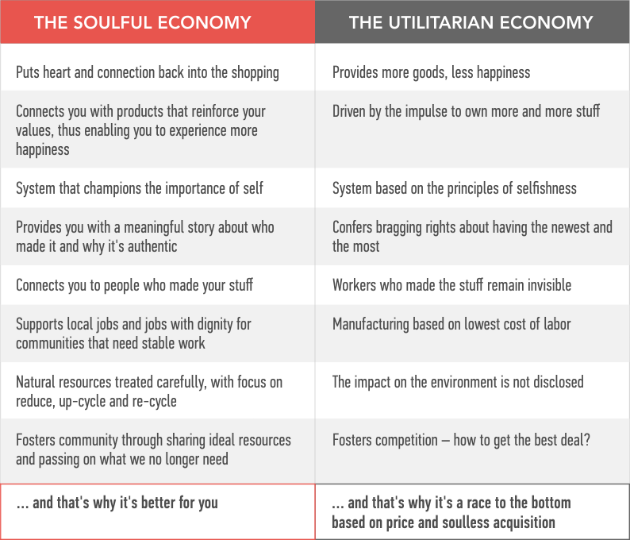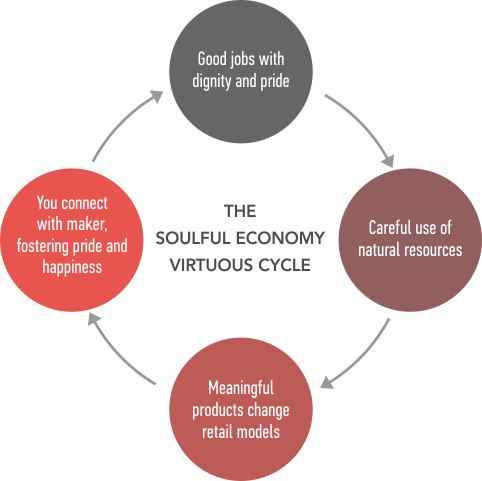
With each dollar we spend, we vote for the world we want.
When each of us buys an article of clothing, shoes -- or anything -- we send a signal down the chain to the marketplace: I like this, I want this, give me more. The market responds as the basic economic laws of supply and demand go to work.
Ethical fashion matters. By ethical fashion we mean any piece of apparel, which through its design, manufacturing and retailing supports fair labor, protects the environment and is free from animal cruelty. It often encompasses artisanal design and production. Some deny that shoppers have the power to influence today's fashion system, because it relies on corrupt and dangerous sweatshop production and only government intervention can solve.
We disagree.
As consumers, we own the impulses we send into the economy. We create the demand. We can make conscious daily choices for the type of world we want, and vote for that world with each purchase we make.
We do this because it's better for us. It makes us happier.
Fundamentally, ethical shopping puts our own welfare, our own enlightened self-interest, at the center of consumer decision-making.
Research shows that an individual's happiness increases when they connect, contribute, give, create and share. So making choices that connect us in a positive way to the people who make our clothes enables our own happiness. Shopping in a way that reinforces our values of fair labor, respects the environment and supports artisans enhances our feelings of contribution and connection -- which makes us happier and, some studies say, even makes us healthier. Simply put, products which actively give back to society and the environment give us purpose, give us stories to tell and give us greater pride, which manifests first as internal happiness and later reflects outwards into the economy.
Like all fashion, ethical fashion must first meet our standards for design, beauty and quality. Ethical fashion has the additional positive and distinguishing attribute of satisfying our higher-order needs. It does this by reflecting the type of world we all want: one with better jobs for more people, a restored environment, valued artisanal production and cultural heritage. The result is apparel with more meaning.
Ethical fashion encourages us to have a relationship with what we wear, so we value what we own more. It spurs the shift from deriving pleasure from acquiring more and more stuff to seeking connection through things that have more meaning. As shopping becomes more satisfying, it will drive us to demand different kinds of products and services. And this creates new business opportunities as our demands drive the economy.
The Soulful Economy Is Already Here
We call this vision the soulful economy because it puts the heart and soul back into commerce for everyone's benefit. It is a vision that's real, good for business and good for people. Most important, it works for the many -- not just for the few. It recognises the momentum of our current system and the key points to influence for real change: the role of consumer demand, the power of marketing to shape that demand, and the force of small and medium entrepreneurs (SMEs) to create good jobs. It is the view of tempered radicals, who recognize the power in the free market system, yet who feel the critical need for change in order to sustain our planet and ourselves.

Graphic by Diane Osgood
It's driven by the belief that we can evolve to an economy that champions the importance of self, rather than the principles of selfishness. It recognizes that consumerism is key, and that it must provide customers with great products and services, of deeper and more unique quality. It will enable customers to create, give, share, contribute and connect -- which in turn enables more authentic happiness and ultimately self-actualization.
And it's here already. Thousands of fashion, accessory and home-furnishing companies specialize in ethical production. We know there are thousands of ethically-minded producers and retailers.
We shop like we mean it. We shop to make the world the way we want it: a world in which more people have access to better jobs, the environment is restored, and beauty and quality are honored. Most of all, we feel good about what we buy, what we wear and who we are.

Graphic by Diane Osgood
This blog post is part of the "Soulful Economy" series produced by The Huffington Post and Same Sky, a trade initiative that creates employment opportunities for women struggling to lift themselves out of extreme poverty. The series is running in conjunction with New York Fashion Week, and aims to use shopping as a force for good. To learn how to become a conscious consumer, read here. And to join the conversation on Twitter, look for the hashtag #SoulfulEconomy.